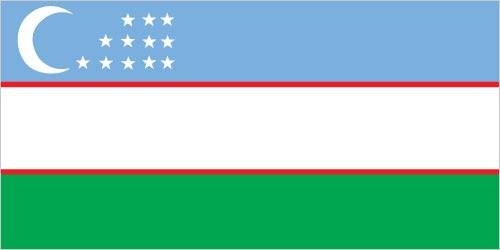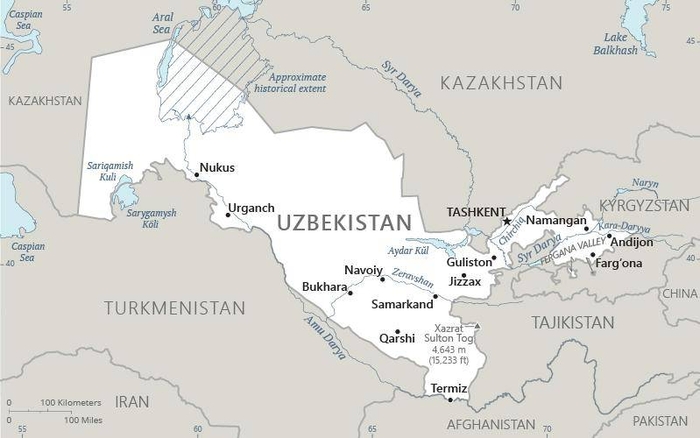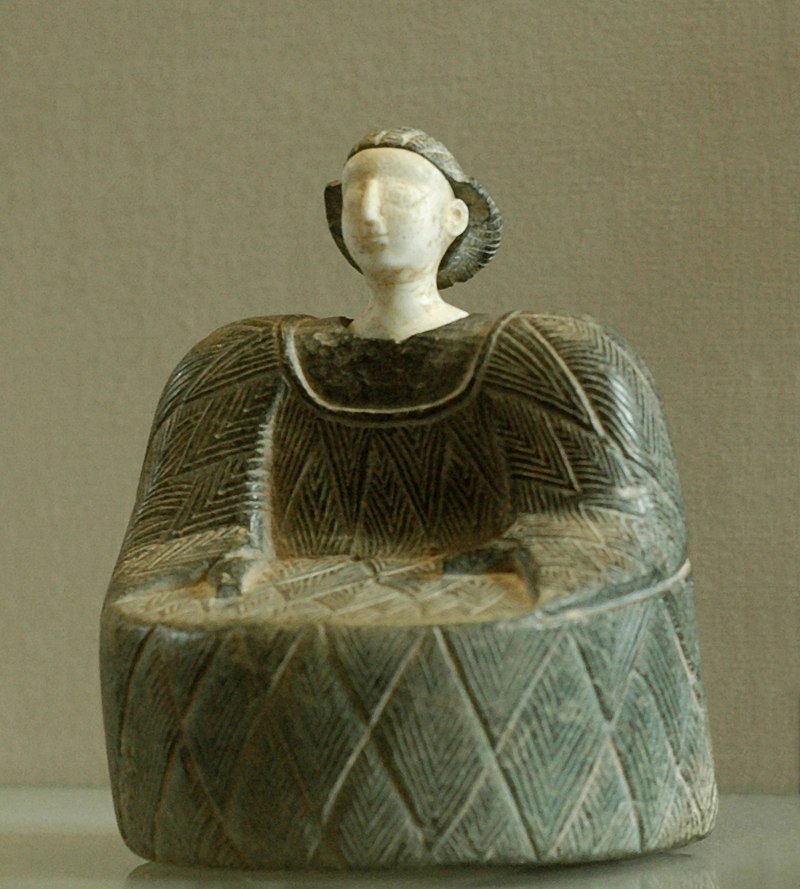174 Uzbekistan

Three equal horizontal bands of blue (top), white, and green separated by red fimbriations with a vertical, white crescent moon (closed side to the hoist) and 12 white, five-pointed stars shifted to the hoist on the top band. Blue is the color of the Turkic peoples and of the sky, white signifies peace and the striving for purity in thoughts and deeds, while green represents nature and is the color of Islam. The red stripes are the vital force of all living organisms that links good and pure ideas with the eternal sky and with deeds on earth. The crescent represents Islam and the 12 stars the months and constellations of the Uzbek calendar.
Flag courtesy of the CIA World Factbook

Map courtesy of the CIA World Factbook

Female statuette wearing the kaunakes. Chlorite and limestone, Bactria, beginning of the second millennium BC
Government
According to Britannica, in 1992 Uzbekistan adopted a new constitution to replace the Soviet-era constitution that had been in effect since 1978. The new constitution establishes the country as a republic and provides for legislative, executive, and judicial branches of government, dominated by a strong executive. Personal liberties generally are protected, but the government is given the right to restrict some of these liberties in certain circumstances. Nationalist or religious political parties are prohibited.
The country’s bicameral legislature (the Oliy Majlis, or Supreme Assembly) consists of a Legislative Chamber and a Senate. Legislative Chamber members are elected to five-year terms; most of the members of the Senate are indirectly elected, but some are appointed by the president. The legislature has the authority to amend the constitution, enact legislation, approve the budget, and confirm presidential appointees.
The president is the head of state and government (with the assistance of the prime minister) and is elected for a maximum of two consecutive seven-year terms, though the term can be extended by referendum. The president appoints the cabinet and the high court justices, subject to parliamentary approval, and has the authority to issue binding decrees and repeal legislation passed by local administrative bodies.
The highest courts are the Constitutional Court, the Supreme Court, and the Higher Economic Court (for commercial cases), in addition to two high courts for the autonomous republic of Qoraqalpoghiston. Judges are appointed by the president, subject to approval by the legislature.
Civil Aviation Agency (CAA)
The Civil Aviation Agency under the Ministry of Transport (CAA) was set up by Decree No. PF-5647 of February 1, 2019 of the President of the Republic of Uzbekistan “On measures to fundamentally improve the system of public administration in the field of transport” and Resolution No. ПК-4143 of the President of the Republic of Uzbekistan “On organizing the activities of the Ministry of Transport of the Republic of Uzbekistan” dated February 1, 2019 in order to ensure its implementation.
Airspace
SkyVector – Google Maps – ADS-B Exchange
ICAO countries publish an Aeronautical Information Publication (AIP). This document is divided into three parts: General (GEN), En Route (ENR) and Aerodromes (AD). ENR 1.4 details the types of airspace classes they chose to adopt from classes A through G.
Drone Regulations
Advanced Air Mobility (AAM) Regulations & Policies
None found by the author.
However, should you, the reader, happen to stumble across something to the contrary, please email the author at FISHE5CA@erau.edu and you may be mentioned in the ACKNOWLEDGEMENTS section of this book by way of thanks for contributing to this free eBook!
Advanced Air Mobility (AAM) News
None found by the author.
However, should you, the reader, happen to stumble across something to the contrary, please email the author at FISHE5CA@erau.edu and you may be mentioned in the ACKNOWLEDGEMENTS section of this book by way of thanks for contributing to this free eBook!
Short Essay Questions
Scenario-Based Question
You have been hired by a Drone Startup Company. Your boss has immediately assigned this job to you.
They need you to prepare a one-page memo detailing the legalities of using a drone to film in Uzbekistan.
They need you to mention any national laws and local ordinances.
They specifically want to know what airspace (insert pictures) you will be operating in and whether or not you need an airspace authorization.
Does it matter whether or not you are a citizen of the country?
Lastly, there is a bonus for you if, as you scroll through this chapter, you find any typos or broken links!
Short Essay Questions
- What are the drone categories?
- How is registration addressed?
- How is remote ID addressed?
- What are the model aircraft rules?
- What are the commercial drone rules?
- Are there waivers or exemptions to the rules? If so, for what?
- Would you share a link to an interactive airspace map?
- How is BVLOS addressed?
- How can you fly drones at night?
- How can you fly drones over people?
- Where do you find drone NOTAMs?
- What are the rules for drone maintenance?
- What are the rules for an SMS program?
- What are some unique rules not mentioned above?
- What are the C-UAS rules?
- What are the AAM rules?

